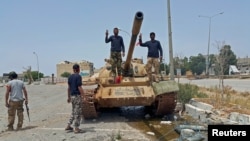A total of 19 Libyan soldiers were killed over the past 24 hours in the eastern city of Benghazi, during a new Libyan army push to retake the city from Islamic militants, officials said on Thursday. Elsewhere in Libya, a local Islamic State affiliate claimed responsibility for a pair of suicide bombings.
In Benghazi, army chief Gen. Khalifa Hifter is seeking to break months of stalemate and fully retake Libya's second largest city. His offensive has primarily targeted the militant stronghold district of al-Laithi and government jets bombed multiple positions overnight and early Thursday morning, a military official said.
In the western city of Misrata - where the most powerful militias are in control of the capital, Tripoli - a suicide car bomber attacked a checkpoint 60 kilometers east of the city, killing one soldier and injuring three, a witness said. In a short statement posted on social networking sites, an Islamic State affiliate in Libya claimed responsibility for the attack.
A day earlier, IS also claimed responsibility for a second suicide bombing near the central city of Sirte - one of the group's strongholds - in which a bomber detonated his device at a checkpoint near the town of Hawara, killing one soldier.
Nearly four years after the ouster of longtime dictator Moammar Gadhafi, Libya is consumed by chaos. The country split is between an elected parliament and weak government, which were forced to relocate from Tripoli to the far eastern cities of Tobruk and Bayda, and a rival government and parliament in Tripoli set up by the Islamist-linked militias that control the capital.
The turmoil has enabled the rise of an active Islamic State branch, which now controls at least two cities along the country's coastline.
The nationwide instability also has heavily affected Libya's vital petroleum industry. Oil output is now estimated at 430,000 barrels a day, down from 1.6 million in 2010.
During a meeting Wednesday night, the militia-backed Tripoli parliament announced it would eliminate all subsides on fuel and foodstuffs, instead replacing them with a cash stipend of 50 dinars (about $20) per citizen per month.
The end of government subsides is designed to save the government billions. A 2014 report by a government auditing agency stated that spending on subsides consumed around $9.3 billion per year, more than a third of the national budget.
It's not yet clear how the Tripoli-based authorities will enforce the new policy in the large sections of the country outside of their control.
Hatem al-Aribi, a spokesman for the internationally recognized parliament in Tobruk, described the decision as another "stunt" by the rival parliament to "rally more support."




